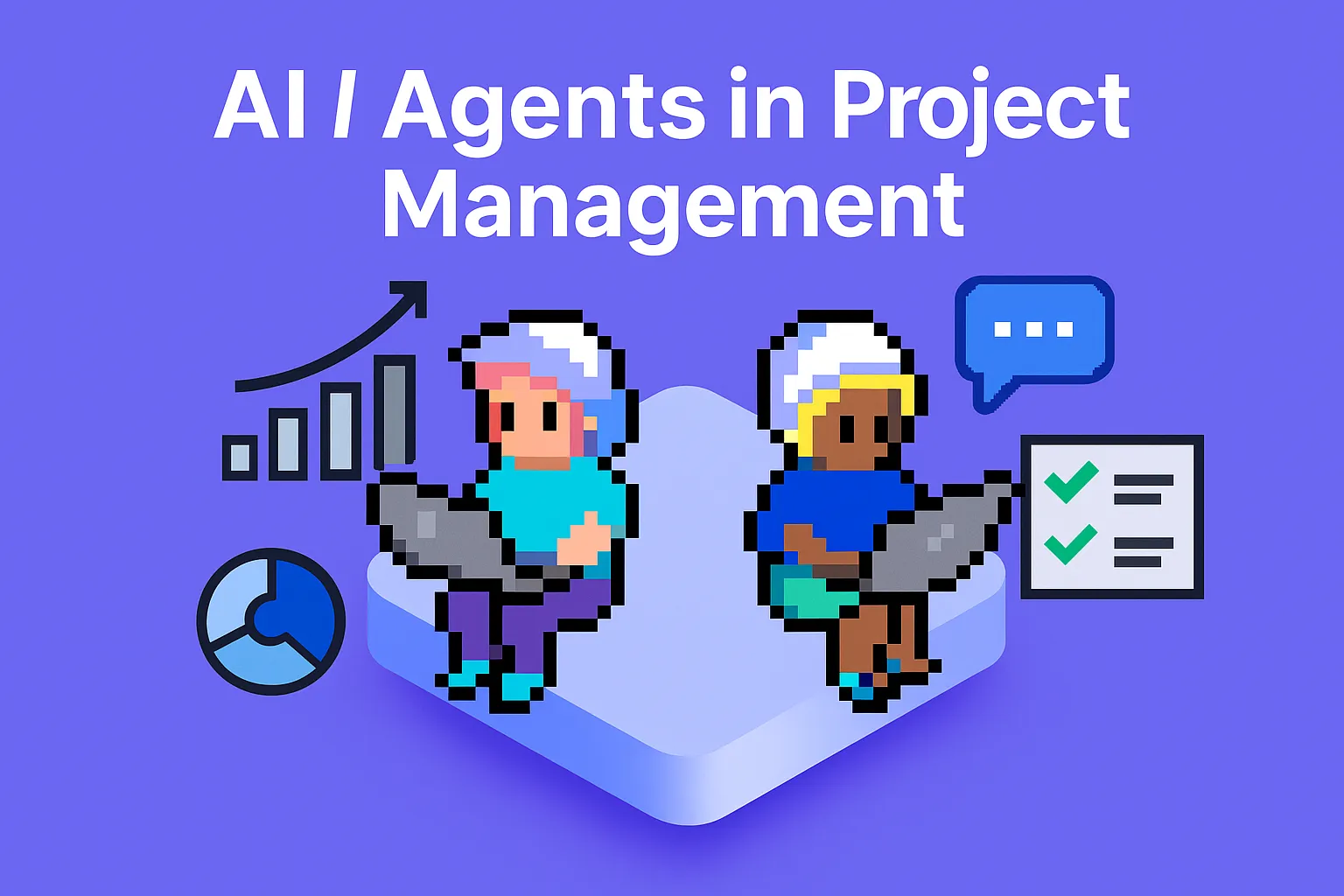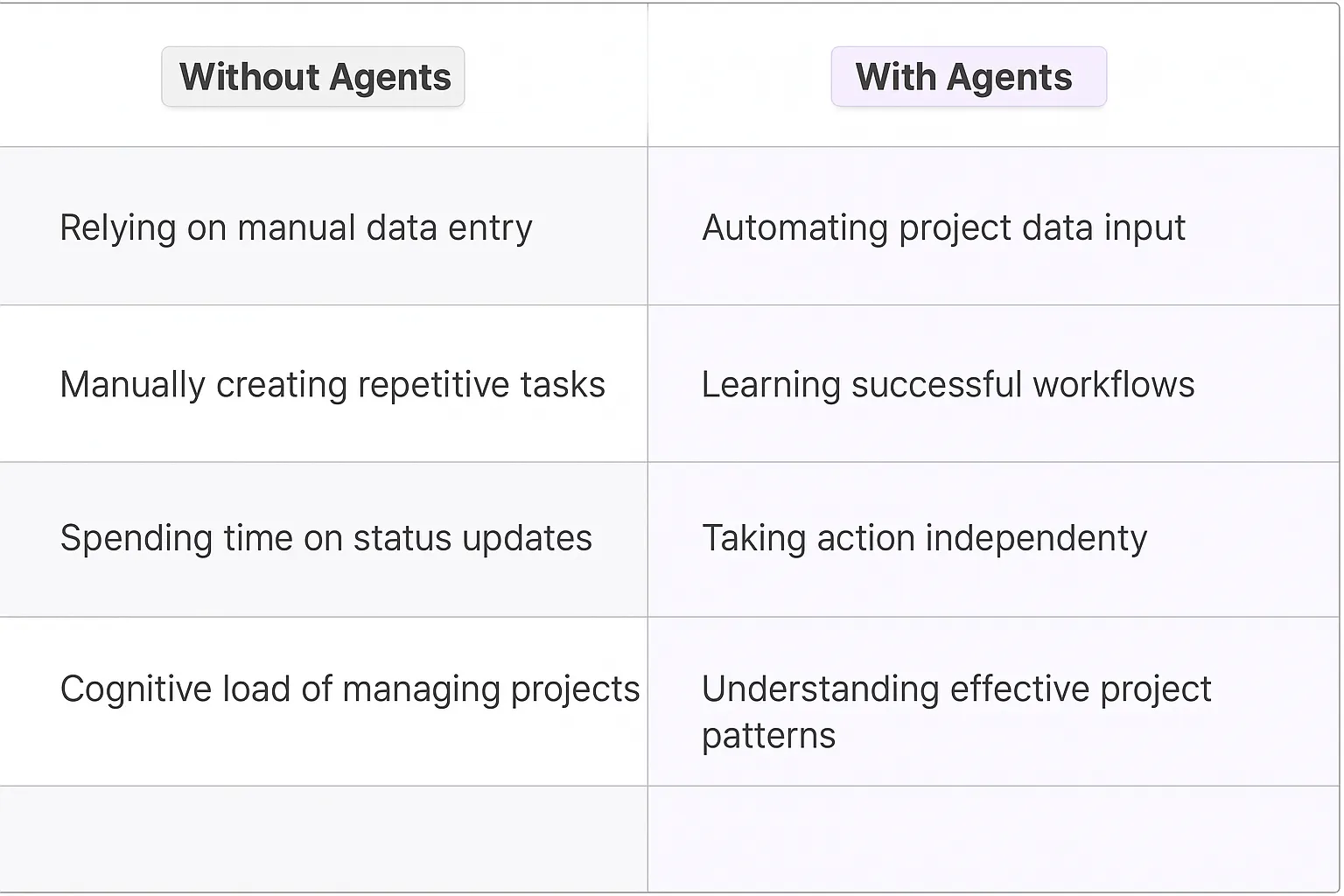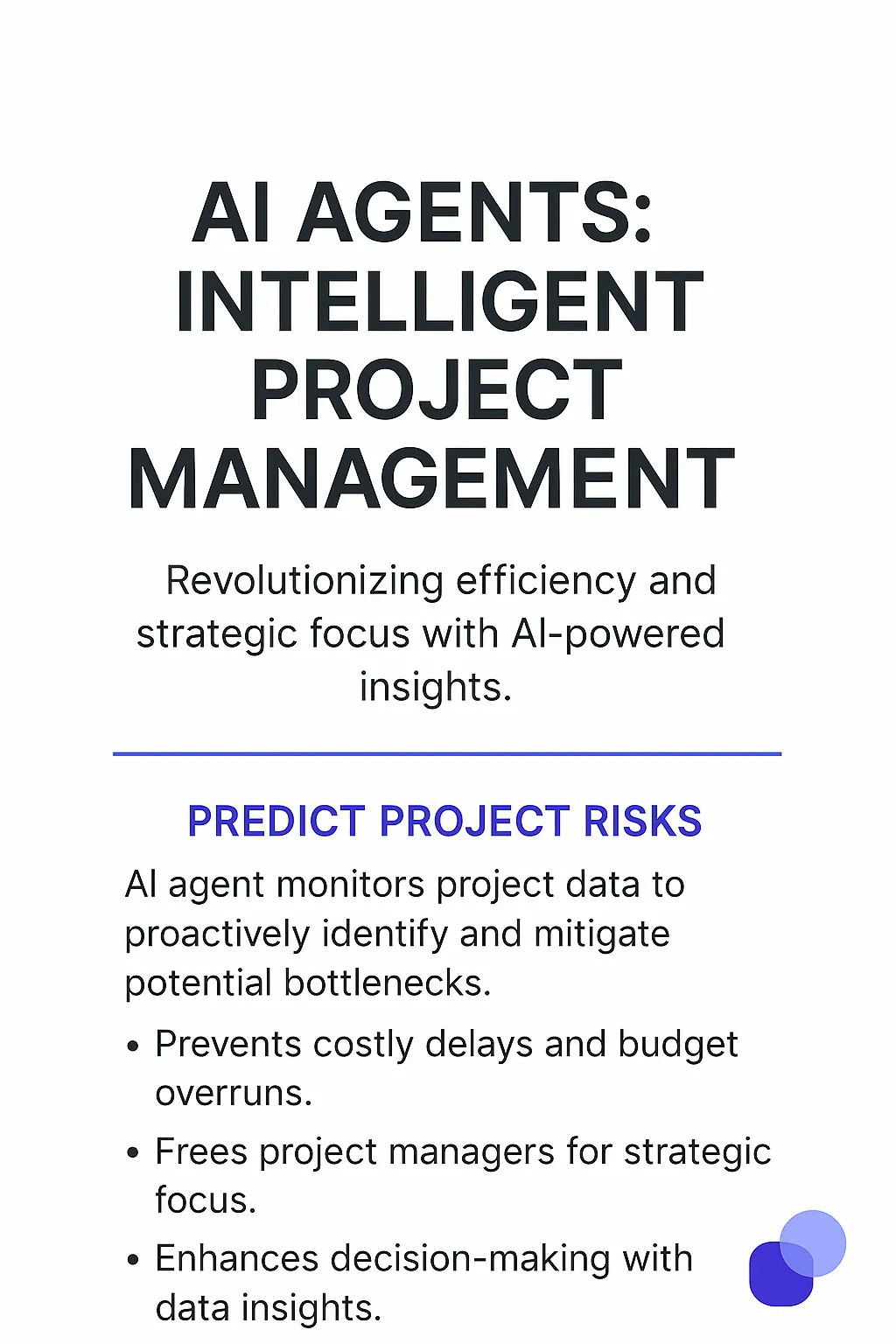Wrike
Understanding Wrike's AI-Powered Project Management Platform
Wrike stands as a versatile project management platform that combines work management, collaboration, and analytics in one unified system. The platform enables teams to plan, track, and deliver projects through customizable workflows, real-time reporting, and cross-team collaboration tools. With the integration of AI capabilities, Wrike has evolved beyond basic project management into an intelligent workspace that actively participates in project execution.
The platform's core strengths include customizable workflows, time tracking, resource management, and advanced reporting capabilities. Teams can create custom dashboards, automate repetitive tasks, and manage complex projects through interactive Gantt charts. The addition of AI Agents enhances these features by introducing predictive analytics, intelligent automation, and pattern recognition that learns from your organization's unique project management style.

Benefits of AI Agents for Wrike
What would have been used before AI Agents?
Project managers and teams using Wrike traditionally relied on manual data entry, repetitive task creation, and time-consuming status updates. They spent hours copying information between tasks, writing detailed project briefs, and crafting status reports. The cognitive load of managing multiple projects meant less time for strategic thinking and creative problem-solving.
What are the benefits of AI Agents?
AI Agents transform Wrike from a project management tool into an intelligent digital teammate that actively participates in project execution. These agents analyze project patterns, learn from successful workflows, and take action without constant human oversight.
The network effects are particularly powerful - as more teams use AI Agents in Wrike, the system builds a deeper understanding of effective project management patterns. This creates a flywheel effect where each successful project improves the AI's capabilities.
Key advantages include:
- Automated task generation based on historical project data and team capacity
- Smart resource allocation that considers team members' skills, availability, and past performance
- Proactive risk identification by analyzing project metrics and flagging potential bottlenecks
- Natural language processing for converting meeting notes and emails into actionable tasks
- Intelligent project templates that adapt based on previous successful projects
The real power lies in the AI's ability to learn from your organization's unique project management style. Rather than forcing teams to adapt to rigid workflows, the AI molds itself to your existing processes while subtly optimizing them over time.
This shift from passive tool to active participant represents a fundamental evolution in project management software. Teams can focus on high-value strategic work while the AI handles the operational heavy lifting.

Potential Use Cases of AI Agents with Wrike
Processes
AI Agents transform project management in Wrike by handling complex, repetitive workflows that typically consume valuable team time. The agents monitor project timelines, automatically adjusting deadlines and dependencies when changes occur. They analyze historical project data to identify potential bottlenecks before they materialize, enabling proactive resource allocation.
When new projects launch, AI Agents can establish standardized templates based on successful past projects, automatically setting up task hierarchies and assigning team members based on their expertise and current workload. They continuously learn from project outcomes to refine these templates over time.
Tasks
The granular task management capabilities of AI Agents in Wrike extend beyond basic automation. These digital teammates excel at breaking down large projects into manageable tasks, estimating completion times based on team velocity data, and intelligently routing work to the right team members.
AI Agents monitor task progress in real-time, flagging potential delays before they impact project timelines. They analyze task completion patterns to identify which team members excel at specific types of work, optimizing future task assignments. When roadblocks emerge, the agents proactively suggest alternative approaches based on successful resolution patterns from similar past situations.
Documentation
Documentation becomes dynamic with AI Agents in Wrike. They maintain living project documentation that updates automatically as work progresses, capturing key decisions, changes, and learnings. The agents extract insights from project communications, compiling them into searchable knowledge bases that teams can reference for future projects.
When team members need specific information, AI Agents quickly surface relevant documentation from past projects, eliminating time spent searching through old files. They also ensure consistency across project documentation by standardizing formatting and terminology while maintaining each team's unique voice and requirements.
Team Collaboration
AI Agents enhance team collaboration by acting as knowledge bridges between different departments and project teams. They identify potential synergies between ongoing projects and connect team members working on similar challenges. The agents analyze communication patterns to suggest optimal meeting times and participants, ensuring productive collaboration sessions.
During project handoffs, AI Agents create comprehensive transition documents, ensuring no critical information is lost between teams. They also maintain context across long-running projects, helping new team members quickly get up to speed by providing relevant historical information and project context.

Industry Use Cases
AI agents within Wrike are transforming how teams operate across multiple sectors, creating measurable impact through intelligent automation and decision support. The integration feels less like adding another tool and more like gaining specialized team members who excel at specific tasks. Drawing from my experience analyzing productivity tools, I've observed these digital teammates becoming particularly effective in complex, multi-stakeholder environments.
What's fascinating is how different industries adapt these capabilities to their unique challenges. Marketing teams leverage them for campaign coordination, while software development groups employ them for sprint planning and bug tracking. The key differentiator isn't just the automation - it's the contextual understanding these AI agents bring to each industry's workflows.
The most successful implementations I've studied show AI agents in Wrike serving as connective tissue between teams, processes, and data. They're not just executing tasks; they're actively participating in the work ecosystem, learning from interactions, and becoming more valuable over time. This creates a compound effect where each successful use case builds upon previous learnings, making the entire system more intelligent and responsive to industry-specific needs.
Marketing Teams Transform Campaign Management with Wrike AI
Marketing teams face intense pressure to deliver compelling campaigns across multiple channels while maintaining brand consistency and measuring ROI. Wrike's AI capabilities fundamentally change how marketing teams operate by removing repetitive tasks and enhancing creative output.
A mid-sized marketing agency managing 15-20 client campaigns simultaneously can leverage Wrike AI to automatically generate campaign briefs, create content calendars, and track performance metrics. The AI analyzes historical campaign data to identify which content types and messaging resonate most with specific audience segments.
When the creative team needs to develop social media content, Wrike AI can analyze top-performing posts and provide data-driven recommendations for imagery, copy length, and posting times. This reduces the guesswork in content creation while maintaining the human creative element that drives engagement.
For campaign reporting, Wrike AI aggregates data from multiple sources and automatically generates insights about campaign performance. Instead of spending hours manually compiling reports, marketing managers can focus on strategic decisions and client relationships. The AI flags potential issues early, like declining engagement rates or missed deadlines, allowing teams to course-correct before problems escalate.
The real power emerges when marketing teams combine Wrike AI with their expertise. A recent example shows a marketing team cutting campaign planning time by 60% while improving engagement rates by 40% through AI-assisted optimization. The technology doesn't replace marketers - it amplifies their capabilities and frees them to focus on high-value strategic work.
This shift represents a new model for marketing operations where AI handles the time-consuming tactical elements while human creativity and strategy drive breakthrough results. Marketing teams that embrace this approach gain a significant competitive advantage in delivering more impactful campaigns with greater efficiency.
Software Development Teams Scale Velocity with Wrike AI
Software development cycles have become increasingly complex as teams juggle multiple repositories, testing environments, and deployment schedules. Wrike AI transforms how development teams operate by introducing intelligent automation that addresses core engineering bottlenecks.
A typical enterprise development team managing 3-4 concurrent projects can leverage Wrike AI to automatically categorize and prioritize technical debt, generate sprint planning recommendations, and forecast potential blockers. The AI analyzes historical sprint data and code commit patterns to optimize resource allocation and predict delivery timelines with remarkable accuracy.
During active development cycles, Wrike AI monitors velocity metrics and automatically flags anomalies that could impact releases. For example, when code review bottlenecks emerge, the AI proactively suggests task redistribution based on team member expertise and availability. This keeps projects moving while preventing developer burnout.
The system's ability to analyze past project data creates a powerful feedback loop for engineering teams. By examining successful sprints, failed deployments, and bug patterns, Wrike AI builds a knowledge base that helps teams avoid repeated mistakes. A mid-sized fintech company recently reduced critical bugs in production by 45% after implementing these AI-driven insights.
Code documentation, often neglected under tight deadlines, becomes more manageable with Wrike AI. The system can analyze code commits and automatically generate documentation drafts, which developers can quickly review and refine. This ensures knowledge transfer without creating additional overhead.
The most compelling aspect is how Wrike AI enhances developer productivity without disrupting existing workflows. Engineers maintain full control over technical decisions while the AI handles routine coordination tasks. One enterprise team reported a 35% increase in feature delivery speed while maintaining code quality standards.
This represents a fundamental shift in software development operations - one where AI handles coordination overhead while developers focus on solving complex technical challenges. Teams that adopt this approach gain significant advantages in delivery speed and code quality.
Considerations and Challenges
Implementing AI agents in Wrike requires careful planning and strategic thinking around several key areas. The integration process affects multiple stakeholders and systems, demanding a thoughtful approach to both technical and human factors.
Technical Challenges
Data privacy remains a critical concern when deploying AI agents within Wrike. Organizations must establish robust security protocols to protect sensitive project information and client data. The AI agent needs proper access controls while maintaining compliance with industry regulations.
API rate limits and system resource allocation require careful monitoring. Heavy AI agent usage can strain Wrike's infrastructure, potentially affecting performance for other users. Organizations should implement usage monitoring and throttling mechanisms to prevent system overload.
Integration with existing workflows presents another technical hurdle. The AI agent must seamlessly connect with current Wrike automations and custom fields while maintaining data consistency across the platform.
Operational Challenges
Change management becomes crucial when introducing AI agents to Wrike teams. Users may resist adopting new tools or struggle to trust AI-driven recommendations. A phased rollout approach with clear communication and training programs helps address these concerns.
Defining the right use cases and boundaries for AI agent involvement requires careful consideration. Not every task benefits from AI intervention - organizations must identify where AI adds genuine value versus where human judgment remains essential.
Maintaining consistency in AI agent responses across different teams and projects poses another challenge. Organizations need to establish clear guidelines for AI agent behavior and regularly review and adjust these parameters based on user feedback and changing needs.
Cost management deserves attention as AI agent usage scales. Organizations should implement monitoring systems to track usage patterns and establish clear ROI metrics to justify the investment in AI capabilities.
AI-Powered Evolution in Project Management
AI Agents represent a fundamental shift in how teams interact with project management software. Through Wrike, these digital teammates transform raw data into actionable insights, automate routine tasks, and actively contribute to project success. The technology's ability to learn and adapt to each organization's unique workflows creates a powerful feedback loop that continuously improves project outcomes. As teams embrace this evolution, they're discovering new levels of efficiency and effectiveness in project delivery, while maintaining the human creativity and strategic thinking that drives innovation.













